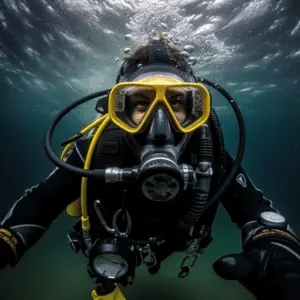Scuba diving illnesses, Scuba diving is a fun and exciting sport. It gives you the opportunity to check out all of the exciting things that we don’t get to see above the surface. It allows you to interact with wildlife you may never have seen before and take in landscapes that you could have only imagined in your wildest dreams. Scuba truly is amazing. However, what isn’t amazing is the long list of possible illnesses and side effects that you may feel because of scuba diving.
If you have experience in the world of scuba diving, you will be more than aware that you are forewarned before even beginning the sport of all of the potential risks that scuba may have to your health. A big part of the initial scuba training is being made aware of possible illnesses you may get and how to avoid experiencing sickness. However, no matter how much advice you have received, a lot of illnesses are still extremely hard to avoid. Here is a rundown of the potential illnesses you can fall victim to because of scuba and how to treat them.
Dehydration

Scuba diving illnesses, One of the big issues that you will face when scuba diving is dehydration. This happens quite often because a lot of people don’t realize that they won’t have access to water when scuba diving and so do not drink enough beforehand. It is only made worse by the fact they are also doing strenuous activities that burn away energy and leave them feeling exhausted. As a result of dehydration, the victim may start to feel tired and confused, which is the last thing you want to be experiencing when you are a few meters under the water’s surface.
It is recommended that when you start to feel even slightly dehydrated, you should leave the water and get yourself some sort of drink. However, if you choose to ignore this, you may later leave the water not feeling too well.
How to treat dehydration
Scuba diving injuries, Rehydrating is the initial step when dehydrated. Water is best for this because fizzy and heated drinks are ineffective. You may develop a headache from dehydration. If so, take some over-the-counter medication or coffee, which helps headaches. After drinking lots of fluids and resting, dehydration symptoms should go away.
Seasickness
Scuba diving illnesses, Usually, when you scuba, you will need to travel via boat in order to reach the perfect spot to explore the water. For some people that have little experience traveling via boat, you may experience seasickness. Seasickness leaves you feeling nauseated and unwell. Though you may think that the sickness symptoms may disappear as soon as you get off the boat and venture into the water, this is not the case. You may even feel seasickness symptoms when you are scuba diving and even when you return to land. Seasickness is not a nice feeling, and so understandably, you will want to get rid of any symptoms as quickly as possible, but how do you do so?
How to get rid of seasickness
The best way you can deal with seasickness is by taking preventative measures before you even get on the boat. There are plenty of over-the-counter medicines that you can buy, which will help prevent seasickness from becoming an issue. However, if you do get over the counter medicine, make sure it is anti-drowsiness medicine as the last thing you want to do is fall asleep when you are in the water. If you return to the land and you still feel sick, the best thing you can do is avoid moving around. Lie back and drink plenty of water, and your sickness should disappear shortly after.
Decompression sickness
The most dangerous and most inconvenient sickness you could feel after scuba diving is decompression sickness. Decompression sickness arises when gas bubbles form in your blood, tissue, and joints. There are plenty of nasty decompression sickness symptoms, such as immobility, headaches, nausea, confusion, and general pain. This is one of the worst ailments you can face as a result of scuba diving, and if you are unlucky enough to fall victim to it, you are likely to feel the symptoms for quite a while.
How to treat decompression sickness
First of all, the main thing you should focus on while scuba diving is taking preventative measures to avoid decompression sickness. Decompression sickness becomes an issue when you take in a lot of gas from your oxygen tank and is more likely to become an issue the further down you travel. A lot of people avoid decompression sickness by monitoring how deep they are traveling and how much oxygen they are consuming. The best way to monitor this is with a dive watch. It’s easy to find a dive watch under $1500so if you are concerned about decompression sickness becoming an issue, it may be worth investing in one.
However, if you do feel symptoms of decompression sickness, there are several ways you can treat it, depending on the severity. Most of the time, if you feel the symptoms of decompression sickness, there is very little you can do yourself, and so you will be dependent on the help of others. You will need immediate medical attention if you get decompression sickness, so it is always best to call for an ambulance or go to your nearest medical facility.
Blocked ears
Though this may not be considered to be a sickness, block ears after a scuba dive can leave you feeling uncomfortable and unwell. Blocked ears are a common issue among scuba divers due to the increased pressure experiences the further down into the water you go. Not only will blocked ears leave you feeling uncomfortable, but they can also really limit your hearing ability, which nobody wants to deal with.
How to treat blocked ears

In most cases, blocked ears are extremely easy to treat. If you are lucky enough, all you need to do is lie on your side and let gravity do the work, and you should be fine. If this doesn’t work, you can also help the process along by giving your head a little wobble. In some cases, getting your ears unblocked can be a difficult task, and so some people just leave it and hope that the liquid will naturally seep out. After all, how long can water stay in your ears before naturally evaporating? Unfortunately, water can stay in your ears for weeks or months, which is irritating. It can cause a terrible bacterial illness, so fix it right away. To evaporate the liquid quickly, some propose using a hairdryer, but don’t burn yourself by holding it too close to your face.
